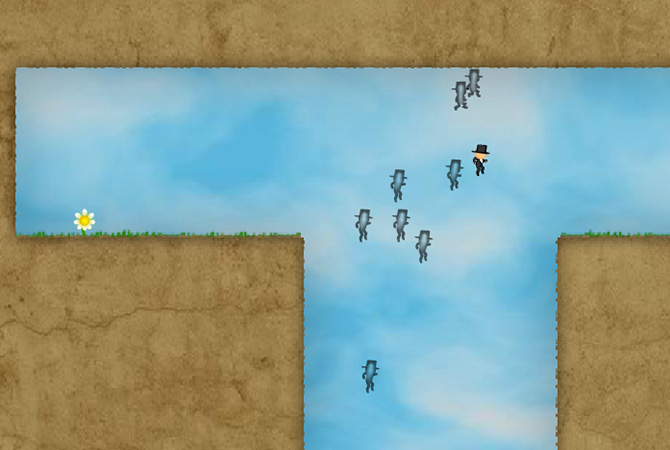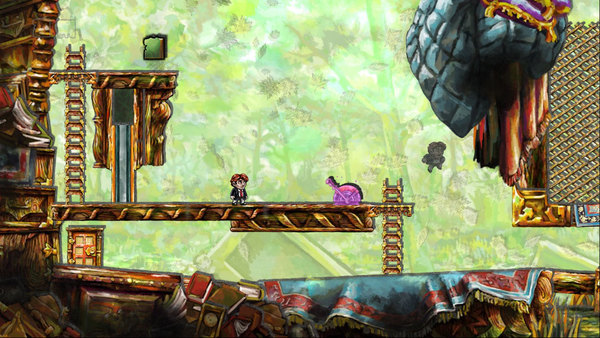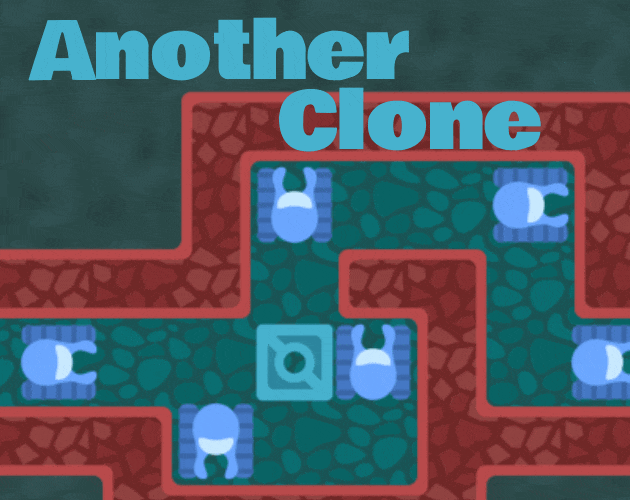Do some stuff, go back in time, and watch your past-you clone do the same stuff. This is what most people think about when you tell them “puzzle game about time travel”. My guess is that many devs run into the same big problem of Standard time travel: when the player travels back and meets their past self, there are two independent avatars to control! The easy solution is to assume that the past player’s actions are fixed and play them back. This doesn’t actually make sense, though: we’re in a new timeline, and the world has changed, so the past player should be able to ‘have chosen’ differently. Still, this solution allows creating many timing based puzzles about planning future actions, which makes it kind of timey enough for someone looking to make a puzzle about time travel.
Here are some games with this model of time travel:
The Company of Myself by 2DArray
Story-heavy puzzle platformer from 2009. I remember it as perfect, with clever puzzles and a beautifully tragic story; nostalgia might be biasing me, so I won’t play it again to avoid it not living up to my expectations. Highly recommended (if not, please don’t tell me).
Braid - World 5 by Jon Blow
Braid’s World 5 nicely ties the Record Clones mechanic with its undo: after undoing, there will be a shadow copy of the world performing any undone actions. This is shown as a parallel, discarded timeline: the shadow player will only interact with the shadow world, avoiding the logical inconsistency of having the past player’s actions be fixed in a changed world. Some special glowing objects do interact with both worlds at once; this extra level of granularity adds some interesting consequences for the model. The overall game is, of course, highly recommended.
Another Clone by knexator
My take on the genre. It is presented as programming robots instead of time travel, which fixes two problems: it makes it natural to scrub through the timeline and fix early mistakes, and removes the inconsistency of past players always acting the same. Unlike most of the games in the genre, all the clones will perform a single set of actions (instead of each one reliving a different ‘life’), which in my opinion makes the puzzles more interesting (but it limits the number of possible puzzles). Highly recommended (but i’m biased on this one).
Some other games featuring this model (I don’t feel like writing about every single Record Clones game):
- The Misadventures of P.B. Winterbottom
- Time Master
- Chronotron
- Cursor*10
- Parts of The Talos Principle
- Holosaur
- Parts of DROD: The Second Sky
- Thinking with Time Machine
- etc.
Variants & future work
You might have guessed it from the rest of the article, but I’m not too fond of this model. Most of the time it’s fiddly, requiring either superhuman amounts of precise planning or waiting forever while on a button ‘just in case’, and in general it breaks one of the golden rules of puzzle games: a solution should take more time to figure out than to execute. I think these flaws could mostly be solved by allowing the player to freely scrub through the timeline to correct minor mistakes or avoid long waits, but surprisingly I haven’t yet seen a game that does this (apparently easy) fix. If you do, please contact me, so I can feature it here.


